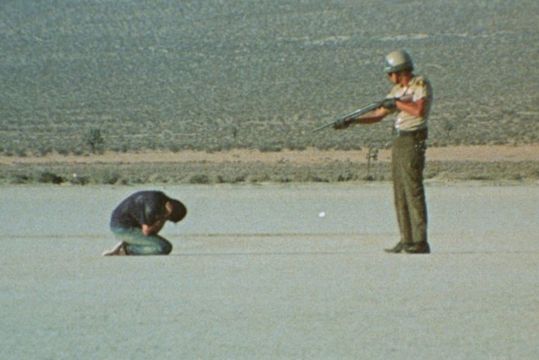Punishment Park

Synopsis
“Watkins’s study of social turmoil in the United States during the Vietnam era finds the Nixon administration establishing detention camps to curb protests from pacifists, students, black militants, and other disruptive elements of society. Invoking powers contained in the 1950 McCarran Act, the government offers convicted offenders the chance to avoid lengthy prison sentences with the option of a three-day stay in a Punishment Park, where prisoners must trek fifty-three miles across the California desert with no food or water while being chased by armed National Guardsmen authorized to shoot them on sight. The film was wholly improvised on location by the actors – non-professionals who actually held the political views they express in the film. The resulting climate became so realistic and tension-filled that at one point Watkins feared the actors playing Guardsmen had loaded their weapons with live ammunition to shoot real bullets at the protesters.” – Harvard Film Archive
"1970. The war in Vietnam is escalating. President Nixon has decided on a secret bombing campaign of Cambodia. There is massive public protest in the United States and elsewhere. Nixon declares a state of national emergency, and – we presuppose in the film – activates the 1950 Internal Security Act (the McCarran Act), which authorizes Federal authorities, without reference to Congress, to detain persons judged to be “a risk to internal security”. In a desert zone in southwestern California, not far from the tents where a civilian tribunal are passing sentence on Group 638, Group 637 (mostly university students) find themselves in the Bear Mountain National Punishment Park, and discover the rules of the ‘game’ they are forced to undergo as part of the alternative they have chosen in lieu of confinement in a penitentiary. Group 637 have been promised liberty if they evade pursuing law enforcement officers and reach the American flag posted 53 miles away across the mountains, within three days. Meanwhile, in the tribunal tent, Group 638 – assumed guilty before tried – endeavour in vain to argue their case for resisting the war in Vietnam. While they argue, amidst harassment by the members of the tribunal, the exhausted Group 637 – dehydrated by exposure to temperatures of 110 degrees Fahrenheit – have voted to split into three subgroups: those for a forced escape out of the Park, those who have given up, and those who are determined to reach the flag…" – Peter Watkins